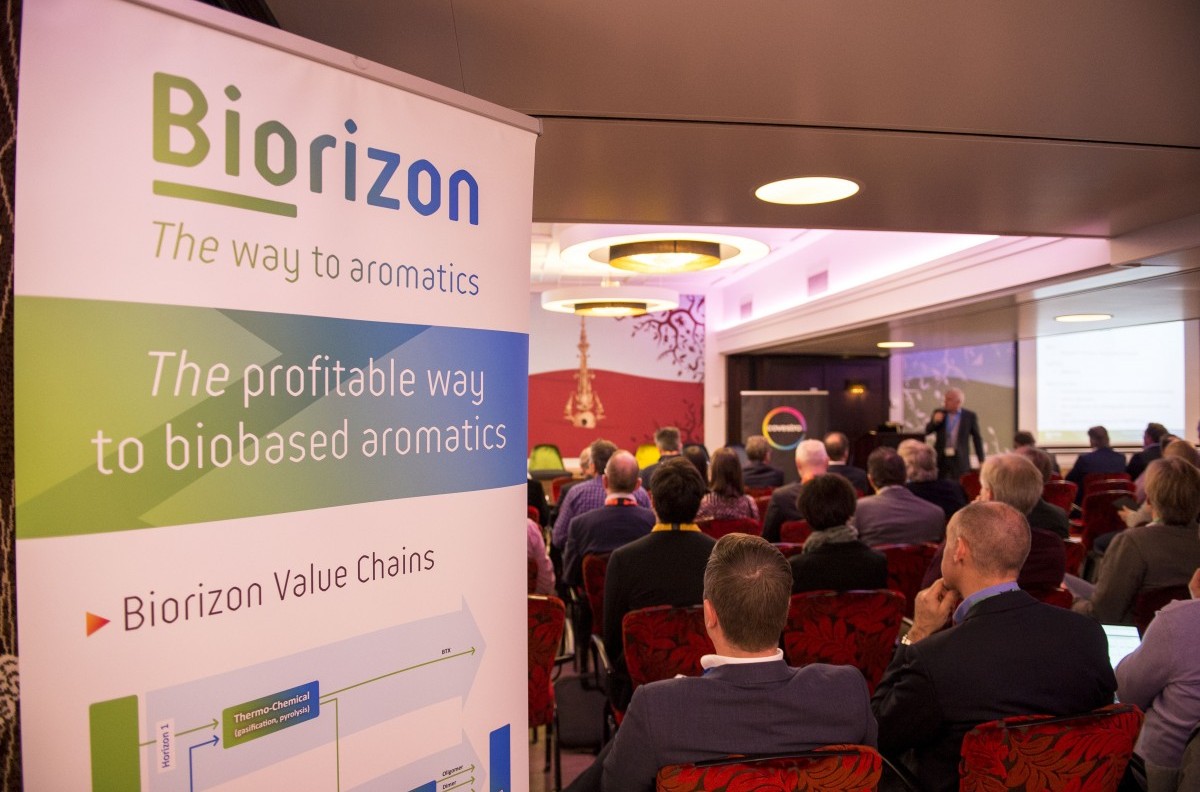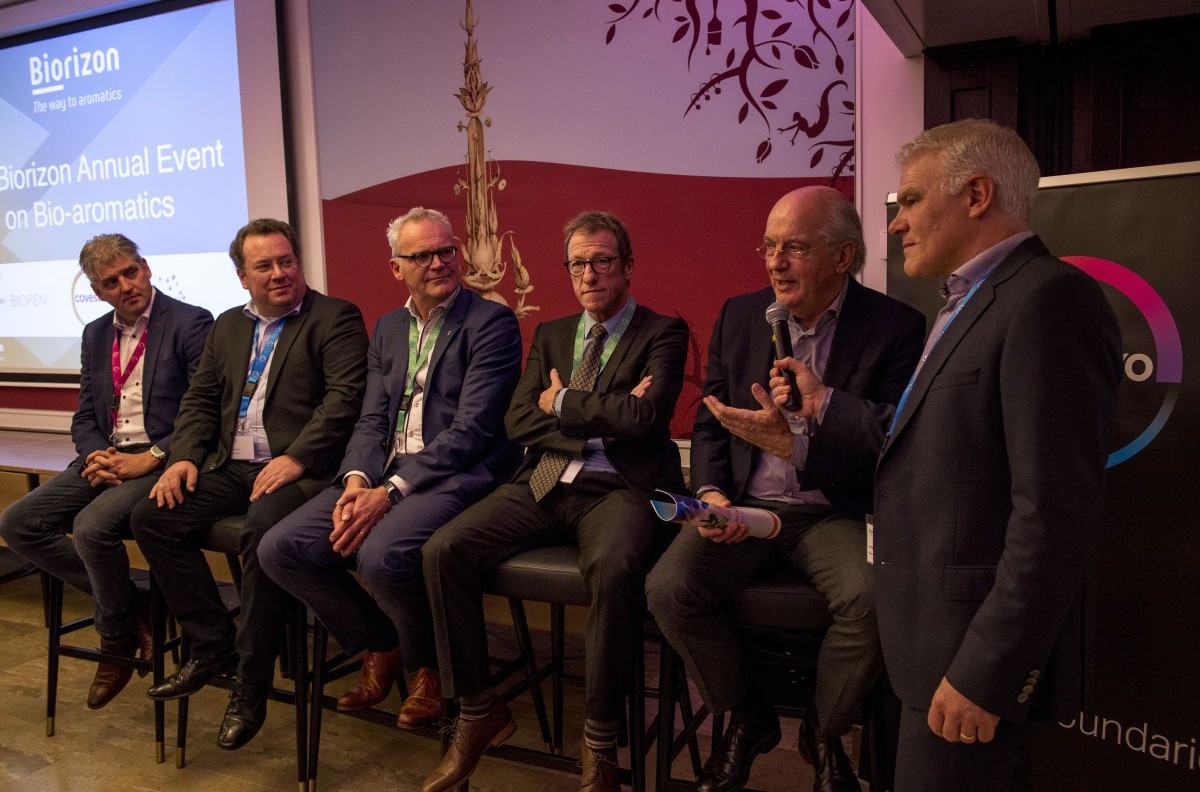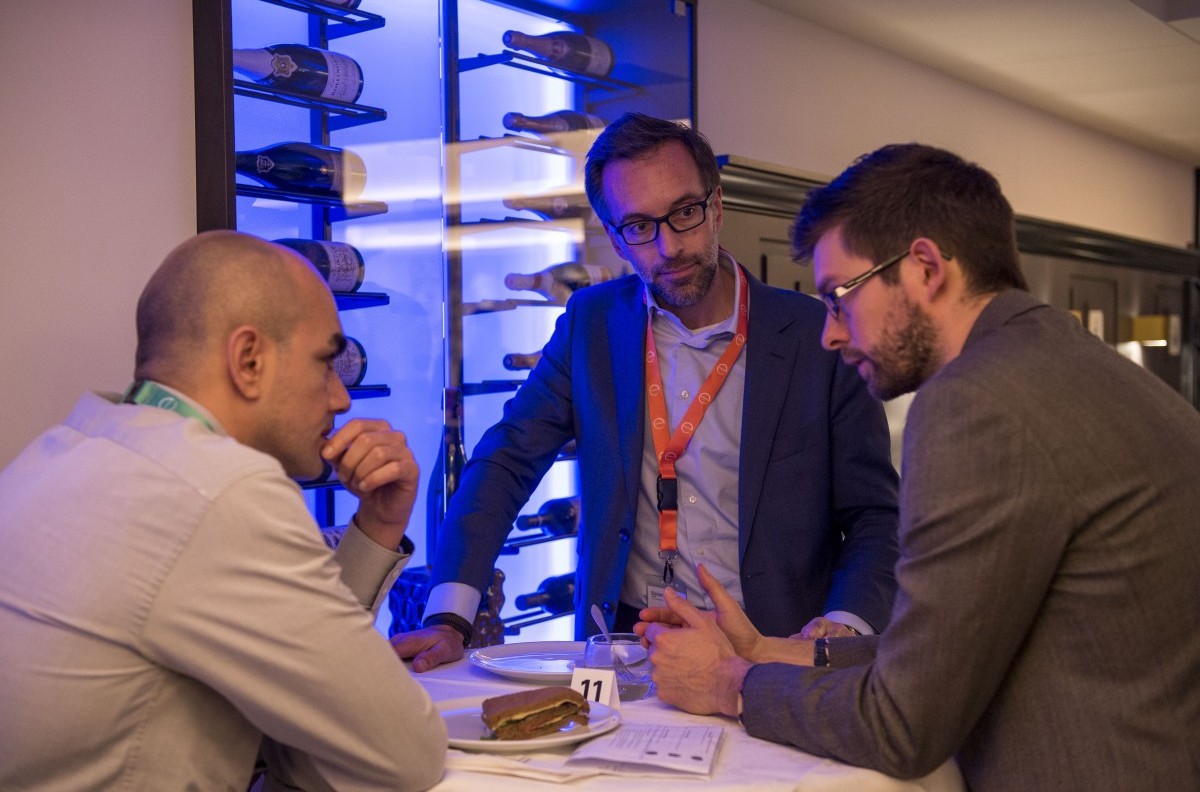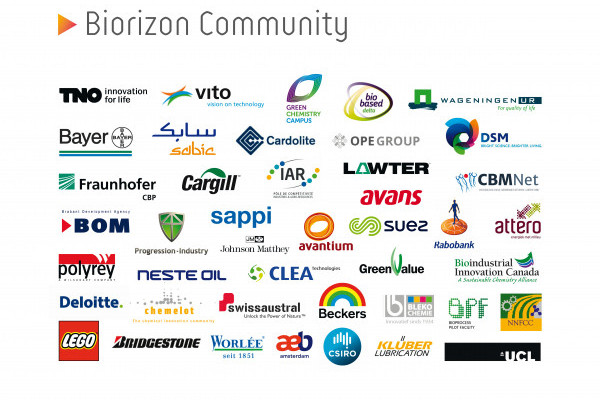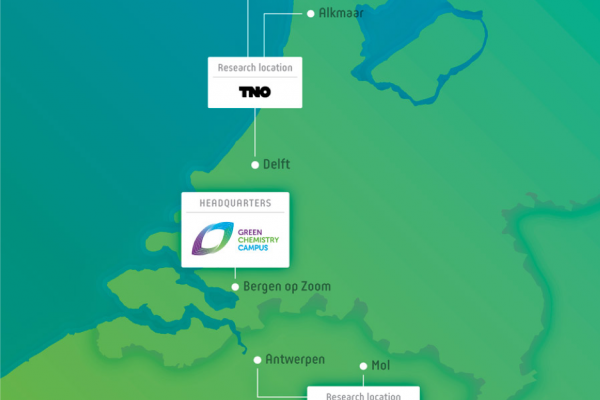News
23-11-2018
Event report 5th Biorizon Annual Event on Bio-aromatics
“We need more initiatives like Biorizon, if we want to meet our goals of reducing CO2 emissions by 49% in 2030.” This statement was made by Emmo Meijer, figurehead of the Top Sector chemistry, during the 5th Biorizon annual event on 15 November in 's-Hertogenbosch.
According to Meijer, Biorizon is a shining example of how the bio-based economy can be accelerated through international cooperation in the region Netherlands/Flanders/Nordrhein-Westfalen. “This allows us to harness the innovative strength that is present in this region. This is necessary, because in 2030 at least 15% of our chemical industry must be bio-based.”
It is therefore essential that we scale up quickly, but the problem is that in many situations the business case is not yet complete. According to Meijer, this is due to the fact that the industry is not on a level playing field with the fossil fuel industry. “But this is a question of time, because the price of CO2 is increasing rapidly. I expect the price to be in the region of € 100 per tonne by 2030.”
We cannot sit back and wait
Arnold Stokking, Director of Industry at TNO adds: “The industry cannot afford to wait until regulations or CO2 prices force them to take action. The transition that is coming is unavoidable, from a climate perspective. It is therefore important to take the initiative now to develop CO2-efficient and renewable bio-based technologies and to implement these.”
“We now know that business case analyses show encouraging results. The replacement of oil will become profitable in a new setting. We are not only looking at the replacement of an existing functionality, as bio-based products also provide a new functionality - a great opportunity! Investment cycles in the industry are long, which is why it is necessary to get on board now and help to determine the road map and choices. Biorizon and the public infrastructure provide the possibilities, bring parties together and accelerate the process, it is now time to link push en pull even more effectively.”
Scaling up
Therefore, scale-up formed a major topic of conversation during the Biorizon event, which attracted more than 150 participants from 16 countries. Johan ter Harmsel, managing director of the company Zeton, which constructs installations on a lab scale as well as pilot plants, demonstration plants and modular factories for commercial production, explained the factors that play a role in scaling up.
And this process moves quickly at Biorizon. Ludo Diels, senior advisor sustainable chemistry at the Flemish research organisation VITO and responsible for Biorizon’s lignin horizon, explained at the start of the day the three routes along which bio-aromatics are produced: using thermochemical processes (pyrolysis and gasification), from sugars and from lignin. Almost all research directions have resulted in the construction of pilot plants or even demo plants within five years, explained Jaap Kiel from the Dutch research organisation ECN, part of TNO and manager of Biorizon’s thermochemical horizon. Gasification is already commercially available and the co-production of bio-aromatics hitching a ride in the process. The pilot process is now in full swing for the Sugars to Aromatics pathway. The same applies to the Lignin to Aromatics pathway. The Lignin Application Centre was opened at the Green Chemistry Campus in Bergen op Zoom at the start of this year, for the development of applications of bio-aromatics from lignin (via pyrolysis or other depolymerisation techniques).
The future
Jan Harm Urbanus, manager of Biorizon’s sugar horizon from TNO offered us a glimpse of the future. The scheduled green gas demos in Alkmaar will be used to demonstrate the co-production of BTX during gasification. A pilot programme is being prepared in Bergen op Zoom for the pyrolysis route. There are many different technologies in the pathway surrounding lignin and a considered choice about which to scale up will be made in 2020. There are now three pilot plants for the sugar/furane route. More plants will be commissioned next year.
Urbanus points out that the focus on the chain is important in all of this: which biomass will we work with? With which partners? Which applications will we develop further? It is important not to choose a substance that could be classified as “hazardous” in the REACH legislation, a topic that Barbara Rafaelli from the European Chemicals Agency (ECHA) presented a lecture on. Bio-based is uniquely positioned to produce less toxic and more environmentally-friendly components and Biorizon expects that REACH will support them in this process. Finally, the business model also needs to make sense.
“For 2019, we are looking for a killer application that will accelerate the entire chain. We are stimulating this by supplying samples of our aromatics to companies and by performing in-house research.”
Successes
Upon reflection, Jan van Havenbergh, managing director of Catalisti, the Flemish equivalent of the Dutch Top Sector Chemistry, is amazed to see how five years ago his organisation was not at all interested in taking part in Biorizon. “However, the fact that renowned parties such as TNO and VITO backed the initiative convinced us to take part. The successes achieved by Biorizon now prove that this method of cooperation is producing results.”
During the event, two speakers presented examples of these “results”: Marc Schmitz from DOW Germany spoke about a new product based on aromatics from lignin: LigniOx, a bio-based substitute for super-plasticiser. This additive is used in construction to make concrete stronger and more fluid, without requiring the addition of extra water.
Bert van de Beld, director of Technology at BTG in Enschede spoke about his company’s fast pyrolysis process, which they have been using for thirty years. This produces a pyrolysis oil (FPBO) that is rich in aromatic compounds. The oil is produced in the 25 MWh demo plant Empyro in Hengelo. Customer FrieslandCampina uses 99% of the oil, as a replacement of the natural gas used for the production of steam. BTG uses the remaining 1% to perform research into bio-refinery.
Venture capital
It is essential to scale up, so that a technology can also generate revenue. However, a significant amount of capital is required for this. Investment manager Rob van der Meij of the Capricorn Sustainable Chemistry Fund was willing to offer a number of tips during the event on how to secure funds from venture capitalists, who often invest on behalf of very wealthy family businesses in the USA. It is important to emphasise how the new technology contributes to the Sustainable Development Goals (SDGs) of the UN. This often serves as an indicator for investors, as they mostly do not understand the technology.
Whether you should do business with venture capitalists is another story, warns Van der Meij, because capturing their attention is an expensive process that requires a tremendous amount of effort. “Our fund receives 500 proposals each year and we only invest in 1 or 2. That speaks volumes. It is often better and easier to channel your energy into obtaining a loan from the bank.”
In summary, 5 years of inter-regional cooperation focused on bio-aromatics from various raw materials demonstrates that Biorizon’s ambition to achieve commercial production is getting closer!
All presentations are exclusively available for members of the Biorizon community for bio-aromatics. Please join us (free of charge).
Source: Agro & Chemistry
